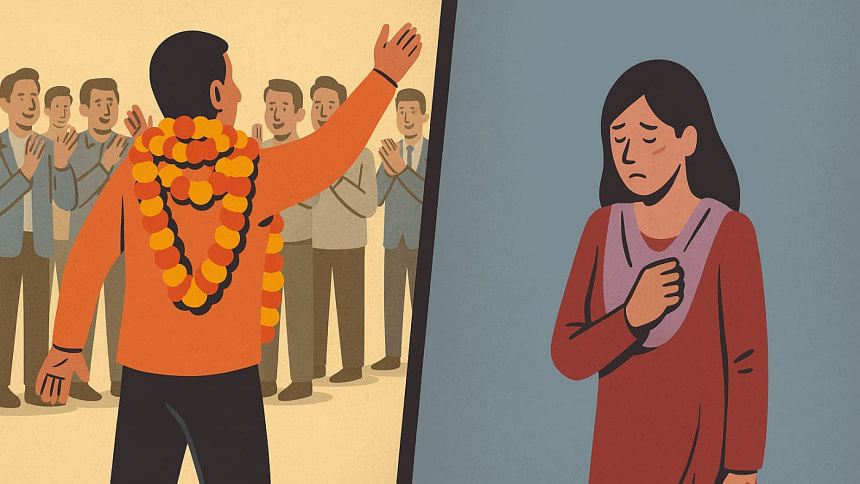A recurring script is enough to prove the pattern

In Bangladesh, one does not need to teach a generation, invent a cure for a disease, feed the hungry, or fight for justice to be honoured.
In this country, respect comes cheaper.
If you want to be celebrated, all you have to do is hurt a woman. Harass her. Kick her in public. Threaten her with rape or worse.
Then walk into court and play the victim card. And step right back out into a crowd of smiling men waiting to receive you with garlands and convoys.
This isn't simply justice gone wrong. This is justice functioning as designed.
Take the case of Mostafa Asif Arnob, a Dhaka University employee, who was accused of harassment by a female student in March.
She filed a case. She asked for safety. Instead, she was hounded online, threatened with rape and murder. Her family was harassed.
In the end, Arnob walked out with bail. And there awaited garlands of flowers.
Then came Akash Chowdhury.
In the last week of May, he was captured on video kicking a woman, and a man, from behind during a peaceful protest in Chattogram. He was then arrested. Detained briefly. Granted bail. And then, like clockwork, came the flowers.
Among those cheering him were members of the same organisation that had publicly expelled him days earlier over the viral assault video.
They expelled him to keep up appearances but later garlanded him all the same.
That's not contradiction. It's choreography.
This is not an aberration. This is a pattern. A growing culture. A nation-wide script.
In Bangladesh, garlands are no longer reserved for the honest or the honourable.
They are awarded to men with violent hands and fragile egos.
Because nothing earns applause faster than reminding a woman that she should be afraid.
And those handing out the flowers? They are not innocent bystanders either. They are enablers.
They mistake brutality for bravery. They confuse manhood with assault. They wrap criminals with petals and call it redemption.
This is not religion. This is not justice. This is not politics either.
And the system plays along.
Police? Silent. The political fronts? First issue press statements. Then prepare the garlands. The society? Mum, until it's time to blame her.
And the woman? She disappears. She gets no garland. No headline. No protection. Just shame, silence, and a message: "Speak again, and it will be worse."
Meanwhile, the man walks free. With impunity. With his head high, and perhaps a position waiting for him for being brave.
With one face, people talk about respect for women. They talk about putting women on the pedestal reserved for mothers and sisters and daughters. But then they turn around to give a hero's welcome to the people who assault women.
There is no compunction, no hesitation in the voices that cheer the men, in the hands that bring the garlands.
This recurring script of assaulting women and then becoming a hero. It's not mere coincidence. It's policy.
This is the real face of public morality in Bangladesh.
Arafat Rahaman is a journalist at The Daily Star. He can be reached at [email protected]

 For all latest news, follow The Daily Star's Google News channel.
For all latest news, follow The Daily Star's Google News channel. 



Comments